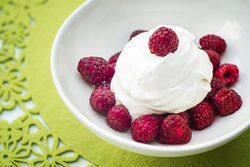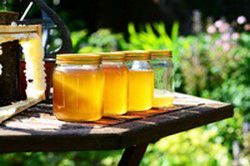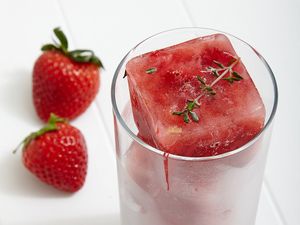Contrary to what you probably think, it is very easy to cook with essential oils (well, some!). You just need to be aware of their potency and the need to dilute them. Behind a drop, there are multiple aromatic molecules that will bring an inimitable little extra to your dish. This is also why it is essential to consider the contraindications of each essential oil that we will present to you throughout this cooking class. Once you have understood a few little tips, you can give way to your imagination. Armed with your bottles of essential oils, you will have nothing to envy of the greatest starred chefs!
Precautions for use
- Because essential oils have incredible taste powertHE
Essential oils have a very powerful taste. Thus, cooking with essential oils will probably prevent you from adding flavor supplements that are often bad for your health (salt, fat, etc.) but which our palate thinks we like. No more need for flavor enhancers, the simplest foods will regain all their flavor thanks to essential oils.
-
Because essential oils are very low in calories
Just because they are called “oils” doesn’t mean they have calories! They are the only oils that will not make you gain weight. If you pay attention to your diet, using essential oils in cooking is perfect for you. You will be able to season all your dishes such as your salads, your soups, your yogurts without needing to add a lot of fat or salt. Your preparations will have more taste and thus, you will also achieve the feeling of satiety more quickly. On the other hand, you should know that, contrary to what one might believe, they do not contain any vitamins (including citrus essential oils).
- Because essential oils are fun
If you like to have fun in the kitchen and discover new flavors, essential oils are for you. But it also works if you don't like cooking at all: aromatic cuisine actually makes cooking a lot of fun! Change your recipes and give way to your imagination with a few drops of essential oil. Once you have acquired the right reflexes, it will be very easy for you to incorporate them into your dishes. Only one requirement: share your culinary successes with us! Whether you're a beginner in the kitchen or a future contestant on a cooking show, you can use them in your daily cooking. Here we go, give way to your desires!
Pay attention to the quality of the essential oils you ingest. It is important to choose quality essential oils (like that of Compagnie des Sens for example :). That is why, it is preferable to consume essential oils labeled ORGANIC and read their composition. The organic label is all the more important for citrus essential oils (or essences). In fact, these are obtained by expressing the zest of the fruit. This part being the one which will retain the most pesticides, if the culture is not organic, you are likely to find some on your plate! As a general rule, avoid ingesting an essential oil whose composition you have not been able to see.
Precautions for use
- Only use 100% pure, 100% natural and chemotyped essential oils and if possible certified Organic. This is the guarantee of having a quality product, with a known chemical composition, and free of pesticides.
- Do not leave essential oils within reach of children.
- The use of essential oils is prohibited for pregnant women under 3 months, as well as infants under 3 months.
- Pregnant women over 3 months, as well as those who are breastfeeding, should be careful in aromatic cooking as much as in aromatherapy. Certain oils are contraindicated for them. When in doubt, caution is required.
- Avoid essential oils in small baby jars (up to 3 years): on the one hand, certain essential oils may be contraindicated for young children, on the other hand, babies already have a wide range of flavors to choose from. discover ! Give him a little more time before introducing him to essential oils.
- For children under 6 years old, it is also important to be careful: their palate is still discovering “classic” tastes. They may therefore not appreciate the original flavors of aromatic cuisine (and, in this case, good luck getting them to finish their plate). It is better to introduce them little by little from the age of 6, starting with known flavors, like citrus fruits, for example.
- If in doubt, do not hesitate to leave us a message on our forum, or to call us!
How to go about cooking with essential oils?
Miscibility of essential oils with ingredients
Essential oils should always be diluted when adding them to your dish. In fact, they are not miscible in water and this would mean taking the risk of accidentally biting into a piece concentrating all the added drops... A very unpleasant culinary experience!! It is therefore advisable to always dilute them in a fatty or sweet medium : any edible vegetable oil, sauce, agave syrup, maple syrup, honey, egg yolk, crushed fruit, melted chocolate or even pancake batter, for example. Without forgetting “thick” creams and liquids: milks and crème fraîches, yogurts, smoothies and soups... Indeed, for the latter, the mixture is sufficiently thick and beaten by the blades of the blender. Easy, right?
Here is a small example among others: a drop of Cardamom or Peppermint in your coffee, would you like it? To flavor your drinks, you will also have to go through an intermediary (most often sugar or honey) which you will mix with your tea, juice or coffee. So don't wait any longer to spice up your daily life!
Good to know: cooking also causes the essential oil to lose its fragrance. Thus, the preparation method will affect the quantity to add. But then, how do you know?
How to incorporate the he?
- Cooks’ tip: grab your spoons!
You must be careful about the number of drops of essential oils you add to your dish, especially if it is the first time you use this EO. To avoid making a mistake and add the right dose, here's our little tip: don't add the essential oil directly to your dish. Take a large spoon and take a sample of your preparation (soups, vinaigrettes, sauce, honey, syrup, pasta, etc.) to which you will add the desired drops of essential oil. Mix the contents of the large spoon using a teaspoon and scoop out some half. Incorporate it into your preparation. Mix and taste. Is the taste strong enough? Stop there. The taste is not strong enough? Add the rest of your spoon. This will allow you, if you have dropped too many drops of essential oil into your sample, to throw it away and take a new one. It's better than throwing away all your preparation, right? This can also allow you to test several essential oils to see which one will pair best with your dish. And if you find that the taste is not strong enough once your sample is incorporated into your preparation, you can always repeat the operation! Smart, right?
What dose to add?
One thing is certain, it is better have a light hand in flavored cookingthat ! To get started, we advise you to follow proven recipes, but once essential oils no longer hold any secrets for you, then let go: thousands of new flavors await you.
<pstyle="margin-bottom: 0cm;">THE citrus essential oils (Lemon, Grapefruit, Bergamot, etc.) have a light taste. You can therefore add several drops to your preparations if you cook them, whereas you will have to be more sparing when you season your raw dishes! Aromatic herbs have a much stronger taste. You must therefore start by adding one or two drops of essential oil (Peppermint, Thyme, etc.). As for essential oils with an exotic flavor (Ylang Ylang, Clove, etc.) their taste is quite original, so it will not please everyone but, in most cases, it is a very good discovery ! Once this principle is in mind, you can take your cues from the quantities.
Some ideas to get started:
- Add one drop of Clary Sage essential oil per person to a dish of pasta, i.e. 4 drops per 400g.
- Add a drop of Lemongrass essential oil for 400g of rice.
- Add 1 drop of Rosat Geranium essential oil for a batch of wild berry muffins.
- Oops, it's too late, I added too much!
Did you have a heavy hand and put too much on? If it is a cooked dish, you can put it back on the heat, cooking will reduce the taste.
If it is a raw dish, you can dilute the essential oil by adding a fatty substance. For example, for a vinaigrette, you can add edible oil (if you have not already incorporated your vinaigrette into your dish, of course!).
Flavor your daily cooking
To get started gently, here are some suggestions for simple ways to incorporate essential oils into your everyday cooking. An example ? One or two drops of Cinnamon essential oil in an apple crumble, a few drops of Lemon essential oil in a cake, you're off to a great start!
Dairy products are our friends!
Whether they are made from animal or vegetable milk, all your yogurts can be flavored with essential oils! In an unsweetened yogurt, add a spoonful of honey in which you will dilute the essential oil of your choice! For a classic scent, add two drops of citrus essential oils (Petit Grain Bigarade, Mandarin, Grapefruit, etc.). For an exotic yogurt, add a drop of Ylang Ylang essential oil.
You can also add essential oil to your whipped cream! We particularly recommend that of Geranium Rosat. This recipe will go perfectly with your red fruit salads!

Flavor your edible oils
What's better than having fragrant olive oil on hand? Add 10 drops of essential oil per 1 liter of edible oil. When choosing the essential oil, leave room to your desires! For example, an olive oil flavored with lavender will add a Provençal touch to your green salad accompanied by figs and raw ham. To season your dishes, also think about hazelnut vegetable oil!

For an original vinaigrette, why not mix two essential oils? Add 1 or 2 drops of essential oil to your vinaigrette when making it, and here you have a vegetable salad embellished by its vinaigrette with Thyme, Linalool and Sweet Orange EOs, for example!
A sweet and flavored touch
In a 250g jar of honey, add 4 drops of Rosemary Verbenone essential oil to sweeten fruit salads in summer and compotes in winter.
More like powdered sugar? Make Cinnamon sugar by adding 4 drops to 500g of sugar. Be careful, shake well to avoid crystals! A marvel on improvised pancakes or applesauce.

Flavor your ice cubes!
Here's a simple tip to lightly flavor your cold drinks: flavor your ice cubes. Add 1 or 2 drops of essential oil to half a spoonful of honey, agave syrup or crushed fruit, add to the ice cube tray, cover with water, freeze!

Was this article helpful to you?
Average grade: 4.6 ( 161 votes)
Bibliography
Work : de la Charie, T. (2019). Treat yourself with essential oils. Why and how does it work? Editions du Rocher.
Related articles
About these tips
This aromatherapy article was written by Théophane de la Charie, author of the book “Treat yourself with essential oils”, accompanied by a multidisciplinary team made up of pharmacists, biochemists and agronomists.
La Compagnie des Sens and its teams do not encourage self-medication. The information and advice provided comes from a reference bibliographic database (books, scientific publications, etc.). They are given for information purposes, or to suggest avenues for reflection: they should in no case replace a diagnosis, consultation or medical follow-up, and cannot engage the liability of the Compagnie des Sens.


